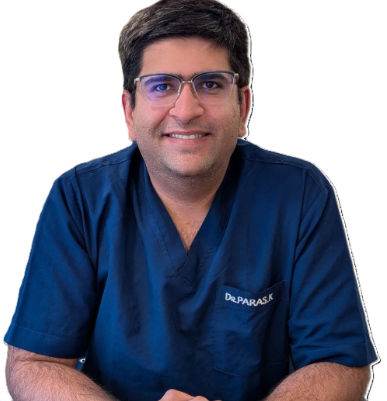Which is the Best Lens for Cataract Surgery?

Quick Summary
- Cataract surgery is a relatively straightforward procedure that can improve vision significantly.
- When choosing the best lens for cataract surgery, several factors need to be considered, including the type of cataract, lifestyle needs, and post-operative results.
- This article provides an overview of the intraocular (artificial) lens, how lenses work in cataract surgeries, and the types of lenses for cataract surgery.
You may be considering surgical correction if you have recently been diagnosed with cataracts. While surgery may seem intimidating, it is a relatively straightforward procedure and can improve your vision significantly. When considering the best lens for cataract surgery, several factors need to be considered.
The factors for choosing the best types of lenses for cataract surgery include the type of cataract, lifestyle needs, and post-operative results. This article will provide an overview of the intraocular (artificial) lens, how lenses work in cataract surgeries, and the types of lenses for cataract surgery.
What are Intraocular Lenses?
Intraocular lenses (IOLs) are tiny, artificial lenses that are surgically implanted inside the eye to replace the natural lens that has become cloudy or opaque. They are used to treat cataracts, a common age-related condition where the natural lens of the eye becomes cloudy and impairs vision.
IOLs are made from a clear, flexible material that can be folded and inserted through a small incision in the eye. Once in place, the IOL unfolds and takes the shape of the natural lens, restoring clear vision.
IOLs are a safe and effective way to treat cataracts and improve vision. However, it's important to note that this is a surgical procedure; it's important to consult a specialised doctor (ophthalmologist) for personalised advice and to evaluate if you are a candidate for this surgery.

Significance of Intraocular Lenses in Cataract Surgery
Cataract surgery is a common and effective procedure to treat cataracts. Intraocular lenses (IOLs) are an essential part of cataract surgery as they help restore vision once the cataract has been removed. IOLs are crucial in providing clear, quality vision after the operation. Let’s look at some of the evident importance of these lenses:
- Improved vision: IOLs are designed to provide clear vision after cataract surgery. The IOLs will restore the patient's vision to what it was before the cataract developed.
- Reduced dependency on glasses: After cataract surgery, patients may no longer need glasses daily. However, reading glasses may still be needed for older people depending on their prescription requirements.
- Safety: IOLs are made of biocompatible materials that are safe for use in the eye. They are also designed to be durable and long-lasting.
- Improved quality of life: Patients who receive IOL implants often experience improved quality of life both physically and emotionally due to improved sight and being able to do everyday tasks more easily without relying on spectacles or contact lenses all the time.
- Better visual acuity: An intraocular lens implant provides sharper images at night compared to wearing eyeglasses because there is less light scattering through an implanted lens compared to a regular spectacle lens. These lenses allow those affected by bifocal problems such as presbyopia to enjoy much clearer night-time vision when driving and engaging in other activities that require good low-light performance at long distances.
- Reduced risk of glare and halos: With modern multifocal lenses, glare and haloes around lights can be greatly reduced, thus providing greater comfort while driving in dimly lit areas at night.
- Customisation: IOLs are available in different types, designs, and materials, which allows for customisation based on the patient's individual needs, such as age, lifestyle, and refractive error.
- Cost-effective: IOLs are a cost-effective treatment option for cataracts, as they do not require ongoing maintenance or replacement like contact lenses or glasses.
Types of Lenses for Cataract Surgery
IOLs are classified based on the design, materials, and properties of the lens, some of the different types of IOLs include:
Monofocal Intraocular Lens
A Monofocal intraocular lens (IOL) is a type of artificial lens which is one of the best lenses for cataract surgery. Monofocal IOLs are designed to provide clear vision at a single distance, usually for distance vision, and do not correct for presbyopia or astigmatism, which are common in ageing eyes. This means that people with this type of IOL may still need to wear glasses for close-up tasks like reading or using a computer.
Monofocal IOLs are made of clear, biocompatible materials and are surgically inserted into the eye through a small incision. They are designed to be durable and long-lasting and do not require any maintenance after the surgery.
Benefits of monofocal IOLs:
- Cost-effective compared to other more advanced intraocular lenses (IOL).
- Do not require complicated technology such as wavefront aberrometry or optical biometry, making it easier to implant while still providing good results.
- Reduction in glare due to halos and starbursts caused by light entering your pupil.
- Low risk of infection because of surgical techniques used during implantation.
- Quick recovery time, so you don't have long downtime waiting for eyesight improvement.
- Long-lasting results since these lenses can last up to 10 years before needing replacement.
Multifocal Intraocular Lens
Multifocal IOL is another best lens for cataract surgery. These lenses are designed to have multiple focusing points, providing both distance and near vision, reducing the dependence on glasses.
Multifocal IOLs are made of clear, biocompatible materials and are surgically inserted into the eye through a small incision. They don't need to be maintained after the operation because they are made to be strong and long-lasting.
Benefits of multifocal IOLs:
- Clear vision: The main feature of multifocal IOLs is that they allow for multiple focal points simultaneously. This means you can see clearly at various distances without using glasses or contacts.Multifocal IOLs work by dividing light into multiple focal points, one for distance and one for near, the brain then adjusts and uses the appropriate focal point depending on the task.
- Depth-of-field focus: Another advantage of this lens is its better depth-of-field focus across all distances (near, intermediate, and far). This means that distant objects remain clear and visible while everything else appears blurry or out-of-focus.
- Enhanced night vision: Multifocal lenses provide better night vision than regular mono-focal ones as they reduce glare from headlights which can interfere with driving.
- Better contrast sensitivity: This lens provides a greater ability to distinguish subtle differences between colours and shades, even in low lighting conditions.
All these features combined make multifocal IOLs an attractive option for those seeking an effective solution for cataracts with added functionality beyond simply restoring lost sight alone!
Accommodative Intraocular Lens
The accommodative intraocular lens is also the best lens for cataract surgery or refractive lens exchange. This type of lens works by adjusting its shape and thus the amount of light that enters the eye when a patient looks at all distances.
Accommodative IOLs are designed to mimic the natural focusing ability of the eye, which is known as accommodation. These lenses can flex or move within the eye, changing the eye's focus. This is achieved through the use of special material or a hinge mechanism which allows the lens to move forward or backwards.
The features of accommodative IOLs include
- Adjustable focus: The lens is designed to shift to accommodate different viewing distances depending on what the person wishes to see.
- Reduced glare: Accommodative lenses reduce glare which may otherwise cause discomfort or night blindness due to halos around lights at night.
- Improved contrast sensitivity: It provides sharper images even under low lighting conditions such as dark rooms or twilight hours during the dusk hour after sunset.
- Increased depth perception: Evidence has shown that this lens provides multiple focal points across different areas within the same eye, resulting in better depth perception than traditional lenses.
Overall, accommodative IOLs offer many advantages over traditional cataract surgery lenses due to their ability to adjust focus based on need, increased contrast sensitivity, and improved depth perception, amongst other benefits mentioned above.
Toric Intraocular lens
Toric Intraocular Lens is another type of artificial lens. It corrects visual problems such as astigmatism that can't be corrected with glasses or contact lenses. The Toric IOL has two optical powers for different meridians; one for focusing up close and another for far away objects.
It helps patients see clearly at all distances and reduces their dependence on glasses or contacts after surgery. They also provide excellent vision quality compared to traditional intraocular lenses.
The main benefit of these lenses is that they help improve vision more than regular intraocular lenses and reduce the need for glasses or contact lenses after surgery. Other benefits include:
- Improved quality of vision, as Toric IOLs, can correct both nearsightedness and astigmatism;
- Reduced glare and halos around lights at night;
- Low risk of postoperative complications;
- The high success rate when compared to any other refractive procedure;
- Little to no recovery time is needed;
- Fast results, typically within 24 hours.
Overall, Toric Intraocular Lenses offer an effective option for those seeking improved visual acuity following cataract surgery. They provide safe treatment with minimal side effects in a very short period which makes it a great choice for many individuals looking to restore their natural sight quickly and effectively.
Reference Chart To Find The Best Cataract Lenses
If you are confused about how to choose the best lens for cataract surgery, this reference chart will help you compare each lens side.
| IOL Type | Cost | Pros | Cons |
| Monofocoal Lens | Affordable | Single lens to correct vision at a distance (near or far). |
|
| Multifocal lens | Expensive | Two different optical power zones provide clear vision with both at near and far distances. |
May cause glare and halos around lights at night making night driving difficult |
| Accommodative Lens | Very Expensive | Flexible optics mimic natural eye movement by shifting focus between objects at different distances. | Very expensive |
| Toric Lens | Keeps Increasing | Uses cylindrical refraction elements to correct corneal astigmatism. |
|
Things to Consider When Choosing a Lens for Cataract Surgery
Choosing a lens for cataract surgery can be challenging but important. It is important to consider various factors, such as the patient’s lifestyle needs, visual acuity objectives, and budget when selecting the best lens for the procedure. Following are some points to remember when choosing a lens for cataract surgery.
- Type of lens: There are several types of lenses available for cataract surgery, including monofocal, multifocal, and accommodative. Monofocal lenses provide clear vision at one distance, usually far, while multifocal and accommodative lenses provide clear vision at all distances.
- Visual needs: Consider your visual needs and lifestyle when choosing a lens. If you have a lot of close-up tasks, such as reading or working on a computer, a multifocal or accommodative lens might be a better option for you.
- Determine each lens option's technology and features: Some types of lenses for cataract offer improved contrast sensitivity compared to traditional mono-focal lenses, while others boast an extended depth of focus, allowing for better intermediate vision when performing activities such as reading at arm's length distance.
- Consider any risks associated with specific lens types: Complications from cataract surgery generally occur rarely, but certain factors can increase risks, such as advanced age or poor health status, so it's essential to weigh these issues carefully when making your decision about the best lens for cataract surgery.
- Cost: Different lenses have different costs, and some may not be covered by insurance. Ensure you understand the lens cost and any additional costs, such as the cost of additional surgery to correct any residual refractive errors.
- Surgery and recovery: The type of lens you choose may affect the surgery and recovery process. Some lenses may require additional surgery or have a longer recovery period.
- Surgeon's experience: The surgeon's experience and skill also play a vital role in the success of the surgery. It's important to find a qualified and experienced surgeon who has performed many cataract surgeries and is comfortable with the type of lens you choose.
It's important to discuss your options and preferences with your eye surgeon to help you decide which lens is best for you.
Takeaway
Cataract surgery is an important and standard procedure that can restore vision in cataract patients. The type of lens used for the procedure will depend on the severity of cataracts and individual patient needs. Intraocular lenses offer a variety of advantages, such as improved visual acuity, decreased glare, and greater independence. Discussing your requirements with your eye surgeon to identify which lens would be best suited for you during cataract surgery is essential.
HexaHealth experts are here to help you select the best lens for cataract surgery. Our team of specialists provide all the necessary information on available lenses and guides you through your options. We understand that selecting the right lens can be daunting, so we’re committed to ensuring you have access to all the information needed to make an informed decision.
Our comprehensive network of providers allows us to assist in finding a qualified specialist experienced in cataract surgeries with the most suitable lenses available. So don’t wait, speak to a HexaHealth Expert TODAY!
Frequently Asked Questions
How to choose the best lens for cataract surgery?
Which type of lens is best for cataract surgery?
Which is better, monofocal or multifocal lens?
Are premium cataract lenses worth it?
What is the best lens for cataract surgery for replacement?
Which company lens is best for cataract surgery?
Who should not get multifocal IOL?
What are the disadvantages of multifocal lenses?
Are there different quality cataract lenses?
How much will Medicare pay for cataract surgery in 2022?
How long do cataract lens implants last?
Are people happy with multifocal cataract lenses?
How long will it take to familiarise yourself with multifocal lenses after cataract surgery?
Last Updated on: 14 February 2023
Reviewer

Dr. Aman Priya Khanna
MBBS, DNB General Surgery, FMAS, FIAGES, FALS Bariatric, MNAMS General Surgery
13 Years Experience
Dr Aman Priya Khanna is a highly experienced and National Board–Certified Laparoscopic, GI, and Bariatric Surgeon with over 13 years of clinical expertise.
He is widely regarded as one of the best bariatric surgeons in Ahmedabad, ...View More
Author

She is an accomplished new-age professional who has interviewed prominent personalities such as Bhaichung Bhutia, G. Sathiyan, Shashi Tharoor, etc. A content writer interested in health communication, graphic desi...View More
Expert Doctors (10)
NABH Accredited Hospitals (5)
Latest Health Articles
Related Treatments




























 Open In App
Open In App